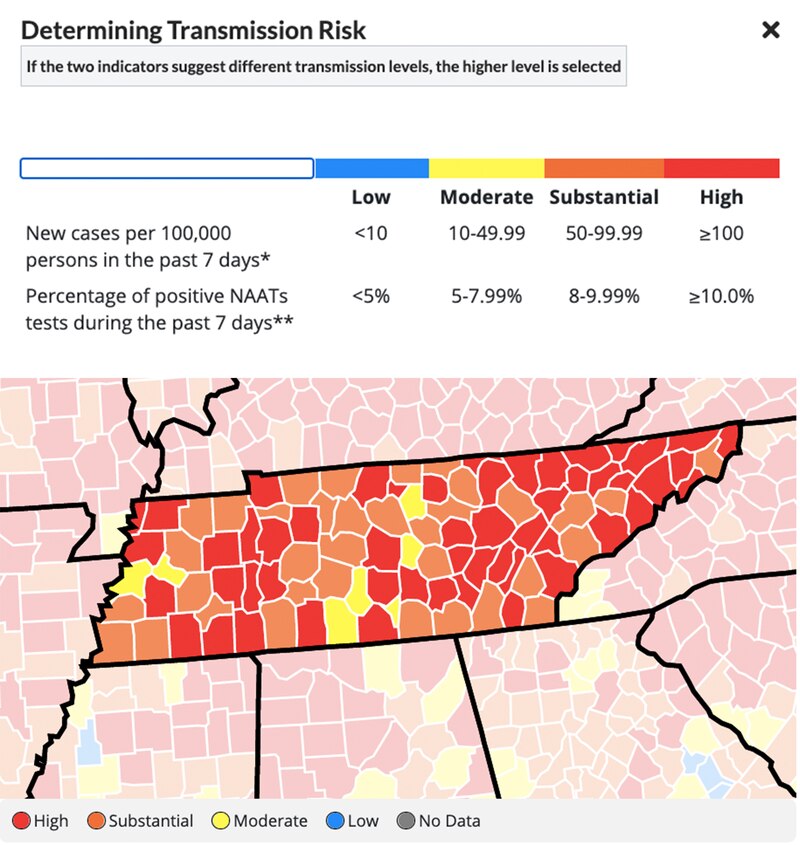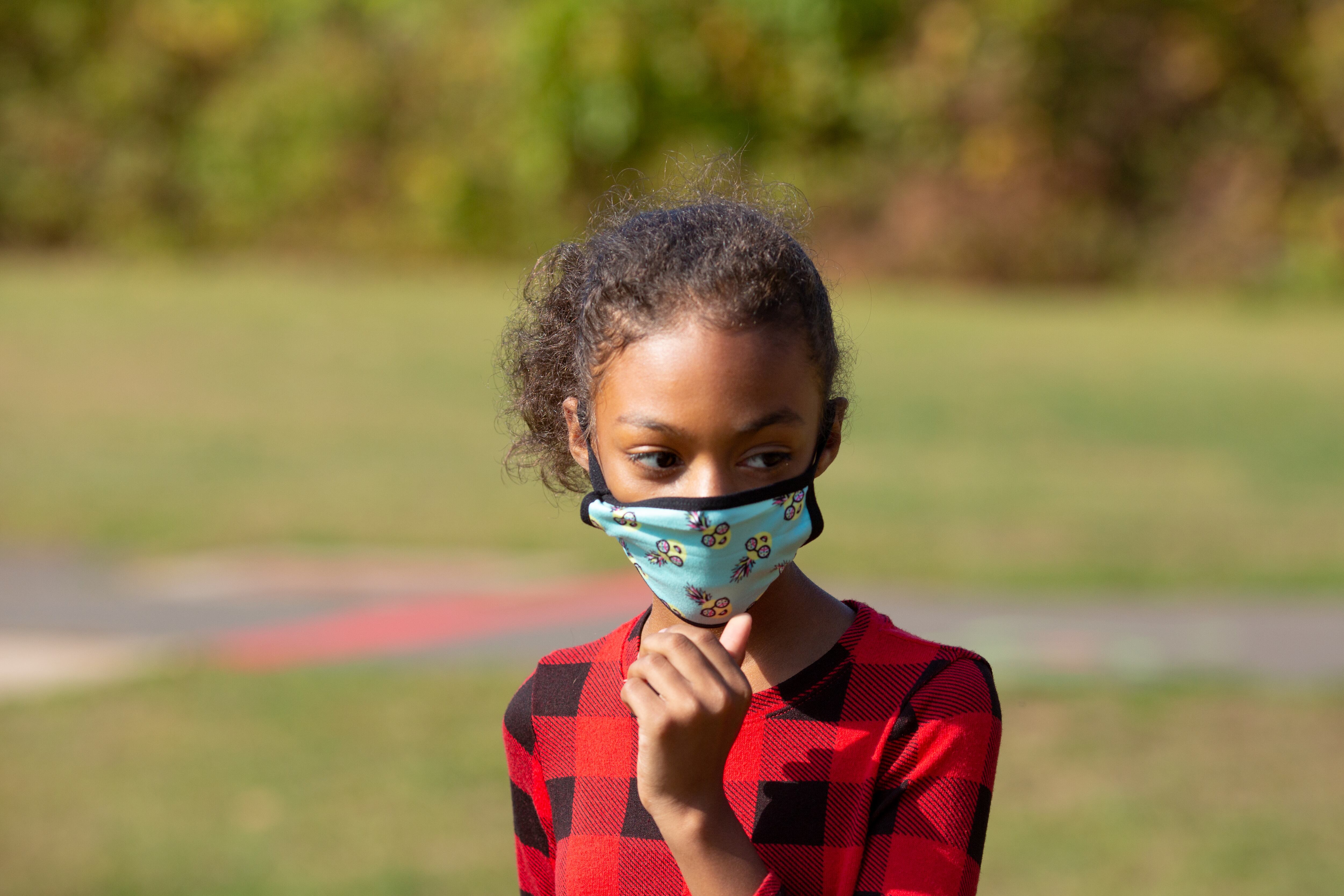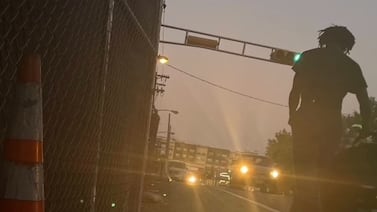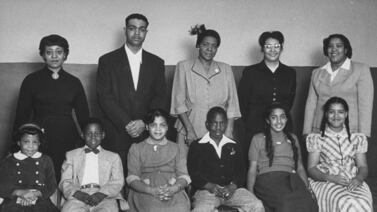Tennessee public schools may soon face tough restrictions before they can issue mask mandates, but the same restrictions would not apply to private schools.
The new requirements for public schools are part of a sweeping bill the Tennessee General Assembly passed in late October during its special session. The education section of the legislation bans public schools and state universities from issuing mask mandates unless five requirements are met, one of which is an unlikely set of “severe conditions.”
Passed largely among partisan lines — with Republicans in favor and Democrats opposed — and awaiting the signature of Republican Gov. Bill Lee, the bill is the latest flashpoint in Tennessee’s heated battle over school safety during the COVID pandemic. The fiery showdown has included court cases, campus protests, and contentious school board meetings.

The most stringent of the five requirements is the “severe conditions” clause, defined in the bill as a county average of at least 1,000 new infections for every 100,000 residents. The Centers for Disease Control and Prevention, however, defines “substantial” community spread as 50-99 new cases per 100,000 residents and “high” as more than 100. By the CDC’s measurements, community transmission in most of Tennessee remains substantial or high.
The severe conditions clause in the Tennessee bill essentially bans mask mandates in public schools and other government institutions.
Tennessee’s Senate Minority Leader Jeff Yarbro, a Nashville Democrat who has a child in public school, called out what he views as a double-standard.
“Even people who don’t really care about the COVID/mask issues understand it’s just wrong to treat private school kids better than public school kids,” he said in a tweet.
Bill limiting public school mask mandates brings both relief and worries
The likely law has generated both support and worry among Tennessee teachers.
Poppy Underwood, a math teacher and parent at White Station High School, a public school in Memphis, welcomes the anticipated relief from Shelby County Schools’ mask requirement.
“It is difficult to wear a mask every day as a teacher,” she said. “I am vaccinated; thus, I should not have to wear a mask.”
A significant number of educators but not the majority of them share Underwood’s sentiments. According to a National Education Association survey, 69% of polled members support school mask mandates. An Associated Press poll showed similar results with 6 in 10 Americans surveyed supporting mask requirements for teachers and students.
Former Shelby County administrator Tom Jones, who has grandchildren in Shelby County Schools, supports local mask mandates and said that stripping public school officials of their authority during a pandemic is “discriminatory.”
The disparate approaches are consistent with precedent, said Adam Kleinheider, spokesman for Lt. Gov. Randy McNally, who co-sponsored the bill.
“Public institutions are often treated differently than private enterprise in Tennessee law, so the distinction here is entirely consistent,” Kleinheider said.
House Speaker Cameron Sexton, a Crossville Republican and a bill co-sponsor, added that legislators agreed to treat “private schools the same as private businesses.”
During the first October special session, House members proposed legislation that would limit COVID safety mandates in businesses, but that bill failed to advance after the Tennessee Chamber of Commerce, several companies, and industry lobbyists voiced concerns. The revised bill, passed during the subsequent special session in late October, dropped the scrutiny of private organizations.
Tennessee private schools divided on mask requirements
In Memphis, which is under a countywide school mask ordinance that could be trumped by the likely new law, some private schools aren’t yet sure if they would change masking policies.
Max Maddock, a spokesman for Hutchison School, said officials are continuing to monitor the situation. Lausanne Collegiate School has no plans to drop its mask requirement, said spokesperson Drew Smith. Although 83% of the school’s students ages 12 and older are fully vaccinated, Smith said the school plans to hold onto its mask mandate until more younger students are able to get immunized. The U.S. Centers for Disease Control and Prevention cleared children ages 5 to 11 for vaccination last week.
“With asymptomatic spread of COVID-19 still being a major concern, we must focus on keeping our community safe, and the simplest way to protect the 374 students who are under 12 and haven’t had a chance to become fully vaccinated is by requiring everyone wear mask on campus while indoors,” Smith said in an email.
In Nashville, where private school enrollment has shot up since the pandemic began, some of the city’s independent schools continue to require masking indoors. Others, including Montgomery Bell Academy and the city’s 16 Catholic schools, recently began to loosen those restrictions.
Brad Gioia, who heads the 825-student Montgomery Bell Academy and is president of Independent Schools of Nashville, believes strict masking policies have helped reduce the school’s coronavirus cases. The all-boys academy, where the vast majority of students and staff are also vaccinated, reported no new COVID cases during the past six weeks.
Gioia said he was troubled by the limitations the anticipated new law would put on public schools, noting that he opposes rules banning masking requirements for public entities.
“I’m personally not in favor of the state blanketly saying public entities cannot mask,” Gioia said.
“I just think local governments, agencies, and school systems know a lot about their populations and their health. I would prefer they were given the right to make a lot of those decisions,” he added.
Should mask policies fall under “local control”?
Local control is a cornerstone of Republican politics and has often meant municipal control. But when it comes to masking in school, Tennessee Republicans have shifted the meaning from local districts to local parents. Some conservative parents have even adopted an increasingly popular rallying cry: “We don’t co-parent with the government.”
A Shelby County Schools spokesperson said that the district is still reviewing the newly approved bill and waiting to see if the governor will sign it before sharing updates with families and employees.
Sean Braisted, spokesperson for Metro Nashville Public School said the state’s second-largest district is also monitoring the governor’s response “as well as relevant federal laws that may supersede state law.”
If signed into law, the new policy may spark the next series of legal battles between the state and its parents and school districts. Currently, 89 districts are suing the state over its school funding formula, which the governor recently acknowledged needed an overhaul.
On Thursday, parents and civil rights organizations sued the state over its policy restricting the participation of transgender athletes in school sports. Legal scholars have questioned the state’s new bill targeting lessons on critical race theory. Shelby County and several parents also have filed multiple lawsuits contesting Gov. Lee’s executive order that allows parents to opt out of school mask mandates. The order, which Lee extended on Friday, has faced multiple legal blows.
Federal judges statewide have sided with the county and parents and issued temporary orders restoring county and school mask mandates while the lawsuits proceed. Although the executive order and the new bill both address masks, they would require separate judicial review, said a legal adviser during one of the special sessions.
As the ongoing war over masks in schools rages on in political chambers and courtrooms, some Tennessee teachers worry about their safety in the classroom.
Art teacher Kathryn Vaughn remains concerned about community spread in her district, Tipton County Schools. Vaughn is vaccinated but many in her county are not. Only 42% of residents ages 12 and over are fully vaccinated, compared to 56% or more in nearby Shelby, Fayette, and DeSoto counties.
Vaughn said that local school boards and local health departments deserve the right to make decisions for the health and safety of their communities.
“Allowing private schools to choose what is best for them but not us in public schools is not fair,” she said. “The fear of catching COVID from my students is real. I love my job, but this year has me feeling incredibly anxious.”
Samantha West contributed to this story.








